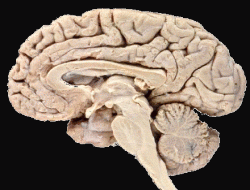March 1, 2013 report
Combination of stresses may produce brain disorders, research shows

(Medical Xpress)—A new study in a mouse model has shown that neuropsychiatric disorders in adults were more likely to develop if the mice had suffered immune challenges before birth and stresses after birth. The study also demonstrated that there are interactions between environmental factors that increase the likelihood of brain disorders developing.
An international team of scientists from Switzerland, Germany, Italy and Denmark exposed heavily pregnant mice to a chemical that simulates a viral infection and therefore delivers a prenatal immune challenge to their growing fetuses. After the baby mice were born, the researchers exposed them to a variety of stresses during early puberty at around six weeks of age. Stresses included having their drinking water removed, being restrained, and being given minor electric shocks to their feet. Control groups were exposed to either the prenatal or postnatal stress, or to neither.
The researchers then tested the cognitive responses of the juvenil mice by administering a series of behavioral tests that were repeated in their adult stage at 10 weeks. The tests included the prepulse inhibition (PPI) response. In this test the response to a loud noise is compared to the response to a quiet noise immediately followed by a loud one. In normal subjects the quiet sound reduces the response to the loud noise, but in schizophrenics, the response to the loud noise is the same in both cases.
The team found the group subjected to the combination of prenatal and peripubescent stresses had greater behavioral changes than any of the control groups. There were also greater changes in brain chemistry in the combination group, with more immune cells being present, as there are in the brains of schizophrenics. The effects seemed to be synergistic rather than cumulative.
The study also showed that when the mice had been exposed to the immune challenge of maternal infection before birth their immune response to stress was much more pronounced than if they had no prenatal exposure to infection.
The researchers also tested the mice for their response to amphetamines and found that if the mice had been exposed to both prenatal and postnatal stresses they were more sensitive to the drugs than if they had only been exposed to one challenge or neither.
Previous research has shown that individual factors can result in mental diseases, but this is the first study to demonstrate interactions between the different immune or stress conditions present during prenatal and postnatal development.
Thus far no single cause has been confirmed for the development of either autism or schizophrenia, and no genetic component has been proven. This has led to the search for environmental factors that could be involved in the development of these and other disorders, and to the hypothesis that a combination of factors may be involved. Environmental factors and physical or psychological abuse are known to be risk factors for the development of schizophrenia, but they do not produce the disorder in the majority of people affected. Until now no one had demonstrated that a combination of factors may be more important.
An earlier study by co-author Urs Meyer of the Swiss Federal Institute of Technology (ETH) in Zurich, Switzerland and colleagues, suggested inflammation of the brain during fetal development may lead to brain disorders such as autism and schizophrenia.
Professor Meyer was also involved in a study with colleagues in China, which presented MRI evidence showing a link between infections suffered by a mother during pregnancy and the development of serious conditions such as autism and schizophrenia in her baby.
The studies may potentially lead to treatments and interventions that could reduce the incidence and severity of mental illnesses.
More information: Stress in Puberty Unmasks Latent Neuropathological Consequences of Prenatal Immune Activation in Mice, Science, 1 March 2013: Vol. 339 no. 6123 pp. 1095-1099. DOI: 10.1126/science.1228261
Abstract
Prenatal infection and exposure to traumatizing experiences during peripuberty have each been associated with increased risk for neuropsychiatric disorders. Evidence is lacking for the cumulative impact of such prenatal and postnatal environmental challenges on brain functions and vulnerability to psychiatric disease. Here, we show in a translational mouse model that combined exposure to prenatal immune challenge and peripubertal stress induces synergistic pathological effects on adult behavioral functions and neurochemistry. We further demonstrate that the prenatal insult markedly increases the vulnerability of the pubescent offspring to brain immune changes in response to stress. Our findings reveal interactions between two adverse environmental factors that have individually been associated with neuropsychiatric disease and support theories that mental illnesses with delayed onsets involve multiple environmental hits.
© 2013 Medical Xpress















